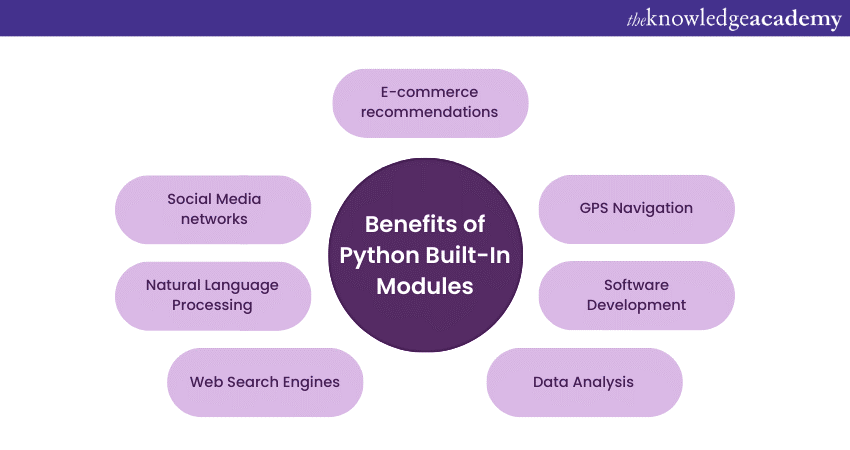We may not have the course you’re looking for. If you enquire or give us a call on +64 98874342 and speak to our training experts, we may still be able to help with your training requirements.
We ensure quality, budget-alignment, and timely delivery by our expert instructors.

Python, a versatile and widely used programming language, is renowned for its rich standard library that includes a vast array of built-in modules. These Python Built-In Modules extend Python's core functionality, providing programmers with tools and utilities to simplify and expedite various tasks across diverse domains.
Python Built-In Modules are pre-written libraries of code that come bundled with the Python language. Explore this blog to learn more about Python Built-In modules. Whether you're a novice looking to expand your Python knowledge or an experienced developer seeking efficient solutions, this blog is your gateway to mastering the powerful tools at your disposal.
Table of contents
1) Understanding Python Built-In Modules
2) Benefits of Python Built-In Modules
3) Common operations Modules
4) Data structures and algorithms Modules
5) File handling and I/O Modules
6) Internet and networking Modules
7) Database access Modules
8) Regular expressions Modules
9) Utility and Specialised Modules
10) Conclusion
Understanding Python Built-In Modules
Python built-in modules are pre-existing libraries or collections of functions and classes that are an integral part of the Python programming language. These modules are included in Python's standard library, which means they are available by default when you install Python, and you don't need to install them separately.
Python's built-in modules provide a wide range of functionalities, from handling mathematics, working with data structures, and interacting with the operating system to supporting network protocols, performing file I/O, and much more. These modules are designed to simplify and expedite various programming tasks, making Python a versatile and powerful language for a broad spectrum of applications. A key feature that enhances Python’s functionality is the Yield in Python keyword, which enables efficient memory usage by allowing functions to return data one piece at a time, especially useful in tasks like handling large data sets or iterative processes.
In essence, These modules are a set of tools and utilities that help programmers perform common and complex tasks efficiently without having to write everything from scratch, promoting code reusability and reducing development time.
Unlock the world of Python with our Python Programming Training. Learn from the experts and master this versatile language!
Benefits of Python Built-In Modules
Python's built-in modules offer several benefits that make them valuable tools for developers. Some of the key advantages include:

1) Ease of use: Built-in modules are readily available in Python, so you don't need to install or import them separately. This ease of access simplifies coding and reduces development time.
2) Code reusability: Built-in modules provide pre-implemented functions and classes for a wide range of tasks. Developers can reuse these components in their projects, reducing the need to reinvent the wheel and promoting efficient coding practices.
3) Consistency: Built-In Modules in Python are maintained as part of the standard library, ensuring a high level of reliability and consistency across different Python implementations.
4) Cross-platform compatibility: Python is a cross-platform language, and most built-in modules work seamlessly on various operating systems, making it easier to write platform-independent code.
5) Scalability: With a diverse collection of modules available, Python can be used for both small scripting tasks and large-scale applications. Developers can scale their projects as needed without significant changes to their codebase.
6) Performance: Python's built-in modules are implemented in C, which can lead to better performance for computationally intensive tasks compared to pure Python implementations.
7) Community support: Many developers and Python enthusiasts contribute to the Python standard library. This community-driven effort ensures that modules are well-documented and continually improved.
Common operations
The "Common Operations" category in Python's Built-In Modules covers a variety of frequently used functionalities that simplify tasks related to mathematics, data manipulation, date and time handling, and more. Here are some key built-in modules in this category:
1) math: This module provides a comprehensive set of mathematical functions and constants, allowing you to perform operations such as trigonometry, logarithms, exponentiation, and more.
2) random: The random module offers tools for generating pseudo-random numbers. It's useful for simulations, games, and any application requiring randomness.
3) datetime: With the datetime module, you can work with dates and times, parse date strings, and perform operations like date arithmetic and formatting.
4) os: The os module gives you the ability to interact with the operating system. You can perform tasks like file and directory manipulation, process management, and more.
5) sys: The sys module provides access to Python's runtime environment. It's often used for interacting with command-line arguments, input/output streams, and system-specific configurations.
6) json: This module allows you to work with JSON (JavaScript Object Notation) data, making it easy to serialise Python data structures into JSON and vice versa.
Elevate your web development skills with our Python Django Training now!
Data Structures and Algorithms Modules
Python offers built-in modules for working with data structures and algorithms, providing developers with efficient and reliable tools to handle various computational tasks. Here are some key built-in modules in the Data Structures and Algorithms.
1) collections: This module offers specialised container data types that extend the capabilities of built-in data structures. It includes data structures like namedtuple, deque, Counter, and defaultdict.
2) heapq: The heapq module provides an implementation of the heap queue algorithm, allowing you to create and manipulate heaps (priority queues) efficiently.
3) bisect: The bisect module offers binary search algorithms for maintaining sorted lists. It's useful for tasks like finding insertion points for new elements in a sorted list.
4) itertools: This module includes a collection of fast, memory-efficient tools for working with iterators. It provides functions like count, cycle, and combinations to streamline iteration tasks.
Don’t miss out on mastering "How to Scroll Down in Selenium Python"! Learn how to handle dynamic pages and automate smooth scrolling effortlessly. Start now!
File Handling and I/O Modules
Python's built-in modules for file handling and input/output (I/O) operations offer a wide range of tools and functions for reading, writing, and manipulating files and data streams. These modules are essential for working with files, whether for data processing, text manipulation, or data storage. Here are some key modules in the File Handling and I/O.
1) io: The io module provides core I/O operations and classes, such as FileIO, which allows you to work with raw binary I/O, and BytesIO, which lets you work with in-memory binary data.
2) fileinput: The fileinput module allows you to iterate over lines from multiple input streams, including files specified as command-line arguments or standard input.
3) pickle: The pickle module is used for object serialisation, enabling you to save Python objects to files and later retrieve them. It is often used for storing and restoring complex data structures.
4) csv: The csv module provides functions for reading and writing CSV (Comma-Separated Values) files. It simplifies tasks like parsing and generating data in tabular form.
Internet and Networking Modules
Python offers built-in modules for internet and networking tasks, making it possible to interact with web services, send and receive data over network protocols, and build network-related applications. Here are some key modules in the "Internet and Networking.
1) urllib: The urllib module is a powerful library for working with URLs. It allows you to fetch data from the internet, send HTTP requests, and handle web resources, making it essential for web scraping and web services interaction.
2) http: The http module provides an HTTP client and server framework, enabling you to create HTTP clients and servers, which is valuable for building web-based applications.
3) socket: The socket module is used for low-level networking, offering the ability to create and manage network sockets. It's essential for network communication, including TCP and UDP socket programming.
4) smtplib: The smtplib module is used for sending email messages using the Simple Mail Transfer Protocol (SMTP). It allows you to automate email communication from within your Python applications.
Database Access Modules
Python's built-in database access modules provide tools for connecting to and interacting with various database systems. These modules are essential for data storage, retrieval, and manipulation in database-driven applications. Here are some key modules in the "Database Access.
1) sqlite3: The sqlite3 module is a lightweight and built-in database module that allows you to work with SQLite databases. It provides a simple and convenient way to perform SQL operations in Python.
2) mysql.connector: The mysql.connector module offers a MySQL database adapter that facilitates connecting to and working with MySQL databases. It allows you to execute SQL queries and manage database connections.
3) psycopg2: The psycopg2 module is a PostgreSQL database adapter for Python. It enables you to connect to and interact with PostgreSQL databases, making it a valuable tool for PostgreSQL-related projects.
Regular Expressions Modules
The re module provides functions for working with regular expressions. It allows you to search for patterns in strings, perform pattern matching and replacement, and extract specific information from text data. The re module is essential for text processing, data validation, and text extraction tasks, making it a valuable tool for working with textual data in Python applications.
Utility and Specialised Modules
Python includes a variety of utility and specialised modules that cater to specific needs and enhance the functionality of your programs. These modules offer tools for tasks like command-line argument parsing, logging, code execution time measurement, and file comparison. Here are some key modules in the utility and Specialised Modules.
Ready to level up your coding skills? Join our Programming Training and master the art of software development!
1) argparse: The argparse module simplifies the process of parsing command-line arguments and generating user-friendly command-line interfaces for your Python scripts. It's especially useful for creating command-line utilities and applications.
2) logging: The logging module provides flexible and configurable logging capabilities. It allows you to log messages, errors, and information, facilitating debugging and monitoring of your applications.
3) timeit: The timeit module is used for measuring the execution time of small code snippets. It helps you profile your code to identify performance bottlenecks and optimise critical sections.
4) difflib: The difflib module assists in comparing and finding differences between sequences, including text files. It can be valuable for tasks like comparing code revisions or finding textual changes in documents.
Conclusion
Python's extensive collection of built-in modules provides a wealth of tools and functionalities that empower developers to tackle a wide range of tasks efficiently and effectively. Throughout this comprehensive guide, we have explored the various categories of Python Built-In Modules, highlighting their significance in Python programming.
Ready to dive into data analysis and statistics? Register for our R Programming Course and unlock the world of data science!
Frequently Asked Questions
What are the Other Resources and Offers Provided by The Knowledge Academy?

The Knowledge Academy takes global learning to new heights, offering over 3,000 online courses across 490+ locations in 190+ countries. This expansive reach ensures accessibility and convenience for learners worldwide.
Alongside our diverse Online Course Catalogue, encompassing 19 major categories, we go the extra mile by providing a plethora of free educational Online Resources like News updates, Blogs, videos, webinars, and interview questions. Tailoring learning experiences further, professionals can maximise value with customisable Course Bundles of TKA.
Upcoming Programming & DevOps Resources Batches & Dates
Date
 Python Course
Python Course
Thu 27th Mar 2025
Thu 29th May 2025
Thu 3rd Jul 2025
Thu 4th Sep 2025
Thu 6th Nov 2025






 Top Rated Course
Top Rated Course



 If you wish to make any changes to your course, please
If you wish to make any changes to your course, please


